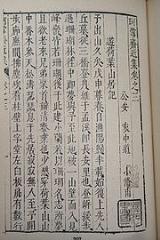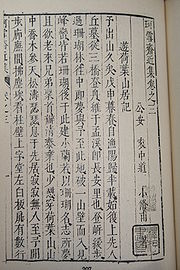
Yuan Zhongdao
Encyclopedia

Yuan Hongdao
Yuan Hongdao was Chinese poet of the Ming Dynasty, and one of the Three Yuan Brothers. His life spanned nearly the whole of the Wanli period in Chinese history. Yuan was from Gong'an in Hukuang. His family had been military officials for generations. Yuan showed an interest in literature from...
(1568–1610). The three brothers dominated the literature of the period. From a family of financial means, they printed and distributed their own works. The youngest of the brothers, Yüan Zhongdao, took years in his pursuit of a civil-service examination degree. The brothers were all openly ambivalent about social position. Yuan Zhongdao spent quantities of money on boats for his extended excursions. His brothers and their families were haunted by disease. Yuan Zhongdao’s own life was a story of breakdown at the cumulative stress of family deaths and repeated failure at the civil service examination. Yuan Zhongdao’s principal health problem was perhaps tuberculosis. Yuan Zhongdao would record extremes of mood within even a daily period suggesting perhaps bipolar disorder. Yuan Zhongdao was denied the complete rest he needed for such a condition due to pressing family needs. Yuan’s diary, Yu chü-fei lu (Travels on Board a Boat) is his literary monument. Yuan’s precarious physical and psychological condition provided the background for his preoccupation with longevity and stress avoidance. He avoided a Buddhistic vegetarian diet, perceiving a need for protein in his diet. Excessive drinking and too many wives were other perceived impediments. His travel diary is full of such detail. Yuan records an early reading of the celebrated novel Jin Ping Mei
Jin Ping Mei
Jin Ping Mei, or The Plum in the Golden Vase is a Chinese naturalistic novel composed in the vernacular during the late Ming Dynasty. The author was Lanling Xiaoxiao Sheng , "The Scoffing Scholar of Lanling", a clear pseudonym, and his identity is otherwise unknown...
(Golden Lotus
Golden Lotus
The Golden Lotus is the highest prize awarded to competing films at the Vietnam Film Festival. It was introduced in 1973 at the 2nd Vietnam Film Festival held in Hanoi. The award is separated in five different categories: feature film; direct-to-video; documentary film; science film and animated...
). He was likewise associated with the radical philosopher Li Zhi 李贄 (1527–1602) and his espousals of popular literature. Likewise Yuan Zhongdao had the acquaintance of the Jesuit missionary Matteo Ricci
Matteo Ricci
Matteo Ricci, SJ was an Italian Jesuit priest, and one of the founding figures of the Jesuit China Mission, as it existed in the 17th-18th centuries. His current title is Servant of God....
(1552–1610). In 1616 he passed the Imperial examination
Imperial examination
The Imperial examination was an examination system in Imperial China designed to select the best administrative officials for the state's bureaucracy. This system had a huge influence on both society and culture in Imperial China and was directly responsible for the creation of a class of...
and obtained a succession of official posts.
POEMS
RECORD OF A DREAMThe road before me completely dark;
I know not where I am.
Black water vast without bounds;
No raft to sail upon.
Above I cannot see the heavens;
Below I cannot see the earth.
Hear the growl of a mad dog;
Right in my path he faces me and barks.
On all sides not a soul to be seen;
Again I try to seek the road back;
Long and long for my old home.
Black, black are the surrounding pines;
Enter main rooms and hear no voices;
Go through the side rooms and see no one.
Grass is matted and chokes the courtyard;
Wind is mournful and blows all around.
Something or maybe nothing; I'm alarmed.
Going in I can't find anyone; outside all is unclear.
Slowly, slowly, where I've been recedes;
My dreaming soul returns and I sweat like rain.
Articles
- Carpenter, Bruce E., "Yüan Chung-tao and the Seventeenth-Century Life", Tezukayama University Review (Tezukayama daigaku ronshū), Nara, Japan, no. 64, 1989, pp. 21–37. ISSN 0385-7743

